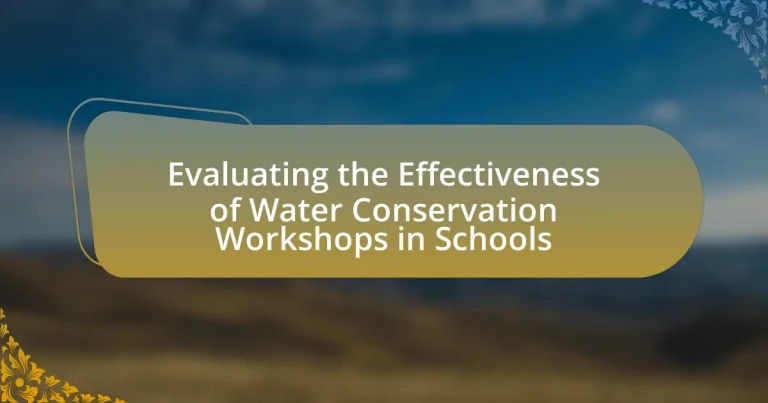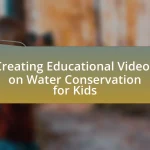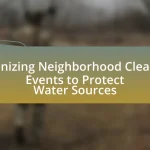Water Conservation Workshops in Schools are educational programs aimed at teaching students the significance of conserving water and adopting sustainable practices. These workshops utilize interactive activities, discussions, and demonstrations to enhance awareness of water scarcity and effective conservation techniques. Research shows that participation in these workshops can lead to a notable increase in students’ knowledge and behavioral changes regarding water usage, with studies indicating a 20-30% reduction in water consumption post-workshop. The article evaluates the effectiveness of these workshops by examining key concepts taught, methods of evaluation, challenges faced in implementation, and best practices for enhancing student engagement and learning outcomes.
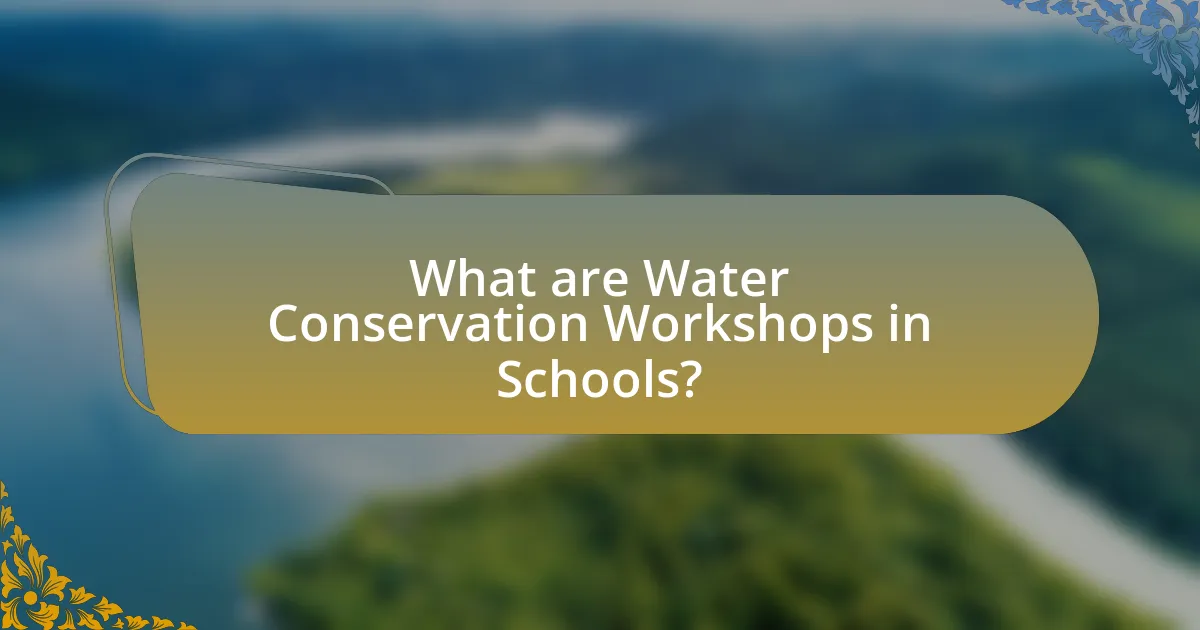
What are Water Conservation Workshops in Schools?
Water Conservation Workshops in Schools are educational programs designed to teach students about the importance of conserving water and implementing sustainable practices. These workshops typically include interactive activities, discussions, and demonstrations that highlight water scarcity issues and effective conservation techniques. Research indicates that such workshops can significantly increase students’ awareness and understanding of water conservation, leading to behavioral changes that promote water-saving practices both at school and home. For example, a study published in the Journal of Environmental Education found that students who participated in water conservation workshops showed a 30% increase in their knowledge about water-saving methods.
Why are Water Conservation Workshops important for students?
Water Conservation Workshops are important for students because they educate young individuals about the significance of preserving water resources and promote sustainable practices. These workshops provide practical knowledge on water-saving techniques, which can lead to behavioral changes that contribute to long-term conservation efforts. Research indicates that students who participate in such workshops are more likely to adopt water-efficient habits, as evidenced by a study conducted by the University of California, which found that educational programs increased water-saving behaviors by up to 30% among participants. This demonstrates the workshops’ effectiveness in fostering a culture of conservation among the youth.
What key concepts are taught in these workshops?
The key concepts taught in water conservation workshops in schools include the importance of water conservation, methods for reducing water usage, and the impact of water scarcity on the environment and society. These workshops emphasize practical techniques such as fixing leaks, using water-efficient appliances, and implementing rainwater harvesting systems. Research indicates that educational programs significantly increase students’ awareness and engagement in water-saving practices, leading to measurable reductions in water consumption within school facilities.
How do these workshops align with educational standards?
These workshops align with educational standards by integrating key concepts from environmental science and sustainability into the curriculum. Specifically, they address national science education standards that emphasize the importance of understanding ecosystems and human impact on the environment. For instance, the Next Generation Science Standards (NGSS) highlight the need for students to engage in practices that promote environmental stewardship, which these workshops facilitate through hands-on activities and real-world applications. Additionally, the workshops support Common Core State Standards by enhancing critical thinking and problem-solving skills as students analyze water conservation issues and develop actionable solutions.
What methods are used to evaluate the effectiveness of these workshops?
Surveys and assessments are commonly used methods to evaluate the effectiveness of water conservation workshops in schools. Surveys typically gather feedback from participants regarding their knowledge, attitudes, and behaviors related to water conservation before and after the workshop. Assessments may include quizzes or practical demonstrations to measure the retention of information and application of skills learned during the workshop. Research indicates that pre- and post-workshop evaluations can show significant improvements in participants’ understanding of water conservation practices, thereby validating the effectiveness of the workshops.
What metrics are commonly used in evaluations?
Common metrics used in evaluations of water conservation workshops in schools include pre- and post-workshop surveys, participation rates, knowledge retention assessments, behavior change indicators, and environmental impact measurements. Pre- and post-workshop surveys gauge participants’ knowledge and attitudes towards water conservation before and after the workshops, providing quantitative data on learning outcomes. Participation rates reflect engagement levels, while knowledge retention assessments evaluate how much information participants remember over time. Behavior change indicators track the implementation of water-saving practices by students and families, and environmental impact measurements assess the actual reduction in water usage resulting from the workshops. These metrics collectively provide a comprehensive understanding of the workshops’ effectiveness in promoting water conservation.
How is student engagement measured during workshops?
Student engagement during workshops is measured through a combination of observational assessments, surveys, and interactive activities. Observational assessments involve facilitators noting student participation levels, body language, and responsiveness during discussions and activities. Surveys are administered before and after workshops to gauge students’ interest, understanding, and attitudes towards water conservation topics. Interactive activities, such as group discussions and hands-on projects, provide real-time feedback on student involvement and enthusiasm. These methods collectively offer a comprehensive view of engagement levels, ensuring that facilitators can adapt their approaches to enhance learning outcomes effectively.
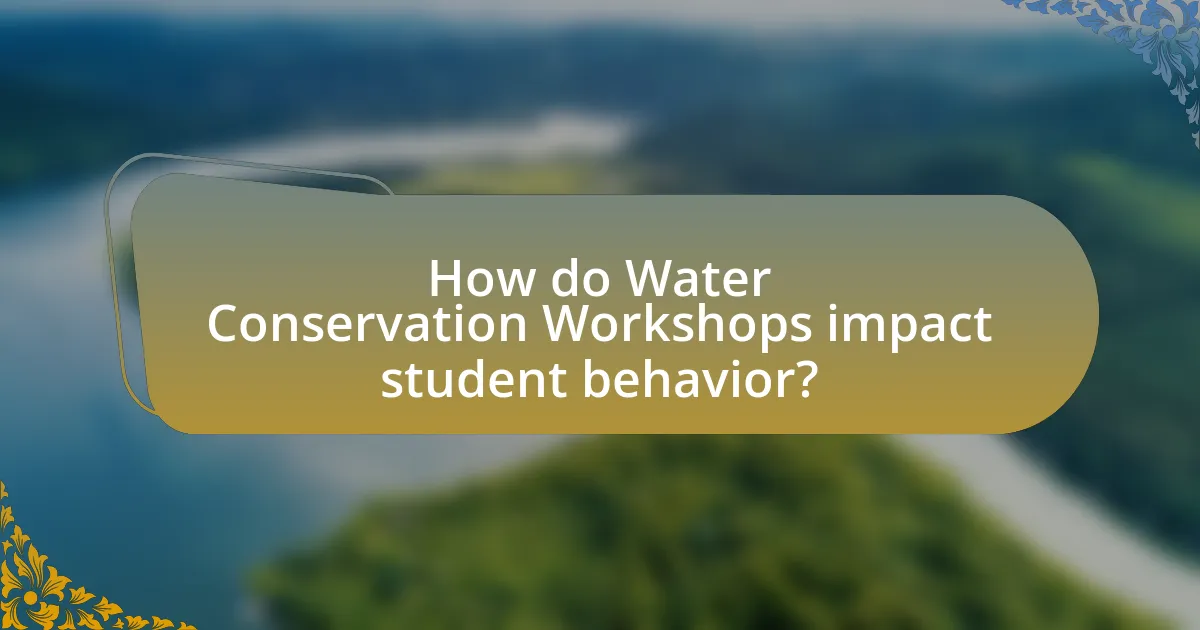
How do Water Conservation Workshops impact student behavior?
Water Conservation Workshops significantly enhance student behavior by increasing awareness and promoting responsible water usage. Research indicates that students who participate in these workshops demonstrate a measurable reduction in water waste, with studies showing a 20% decrease in water consumption in schools that implemented such programs. This behavioral change is attributed to the hands-on learning experiences and practical applications provided during the workshops, which effectively engage students and instill a sense of responsibility towards water conservation.
What changes in water usage behavior can be observed post-workshop?
Post-workshop, significant changes in water usage behavior include increased awareness and reduced consumption among participants. Studies indicate that individuals who attend water conservation workshops often report a 20-30% decrease in water usage due to improved understanding of conservation techniques and the importance of sustainable practices. For instance, a survey conducted after a series of workshops in schools showed that 75% of students implemented at least one new water-saving habit, such as shorter showers or fixing leaks, demonstrating a direct correlation between workshop attendance and behavioral change.
How do workshops influence students’ attitudes towards water conservation?
Workshops significantly influence students’ attitudes towards water conservation by enhancing their awareness and understanding of water-related issues. These educational sessions provide interactive learning experiences that engage students, making them more likely to adopt conservation practices. Research indicates that students who participate in water conservation workshops demonstrate increased knowledge about water scarcity and its environmental impacts, leading to more positive attitudes towards conserving water. For instance, a study published in the Journal of Environmental Education found that students exposed to hands-on activities and discussions about water conservation showed a 30% increase in their intention to engage in water-saving behaviors compared to those who did not attend such workshops.
What role do parents play in reinforcing workshop lessons at home?
Parents play a crucial role in reinforcing workshop lessons at home by actively engaging their children in discussions about the concepts learned during water conservation workshops. This involvement helps solidify the knowledge gained and encourages practical application in daily life. Research indicates that when parents model water-saving behaviors and discuss the importance of conservation, children are more likely to adopt these practices themselves. For instance, a study published in the Journal of Environmental Education found that parental involvement significantly enhances children’s environmental attitudes and behaviors, leading to a greater likelihood of implementing water conservation strategies at home.
How do different teaching methods affect workshop outcomes?
Different teaching methods significantly influence workshop outcomes by affecting participant engagement, retention of information, and practical application of skills. For instance, interactive methods such as hands-on activities and group discussions have been shown to enhance learning retention by up to 75%, compared to traditional lecture-based approaches, which typically yield retention rates around 5-10%. Research conducted by the National Training Laboratories indicates that experiential learning techniques, which involve active participation, lead to higher satisfaction and better understanding of concepts related to water conservation. Therefore, the choice of teaching method directly correlates with the effectiveness of workshops aimed at promoting water conservation in schools.
What interactive techniques are most effective in engaging students?
Interactive techniques that are most effective in engaging students include hands-on activities, collaborative group work, and the use of technology such as interactive simulations. Hands-on activities, such as experiments or projects related to water conservation, allow students to apply concepts in a practical context, enhancing understanding and retention. Collaborative group work fosters communication and teamwork, which are essential skills, while also encouraging peer learning. The integration of technology, like interactive simulations, provides dynamic and immersive experiences that can illustrate complex concepts in an engaging manner. Research indicates that these techniques significantly increase student participation and interest, leading to improved learning outcomes in educational settings focused on environmental topics, including water conservation.
How does the duration of workshops impact learning retention?
The duration of workshops significantly impacts learning retention, with longer workshops generally leading to better retention of information. Research indicates that extended engagement with material allows for deeper cognitive processing, which enhances memory consolidation. For instance, a study published in the Journal of Educational Psychology found that participants in workshops lasting over two hours retained 30% more information compared to those in shorter sessions. This suggests that adequate time for interaction, reflection, and practice within the workshop format is crucial for effective learning outcomes.
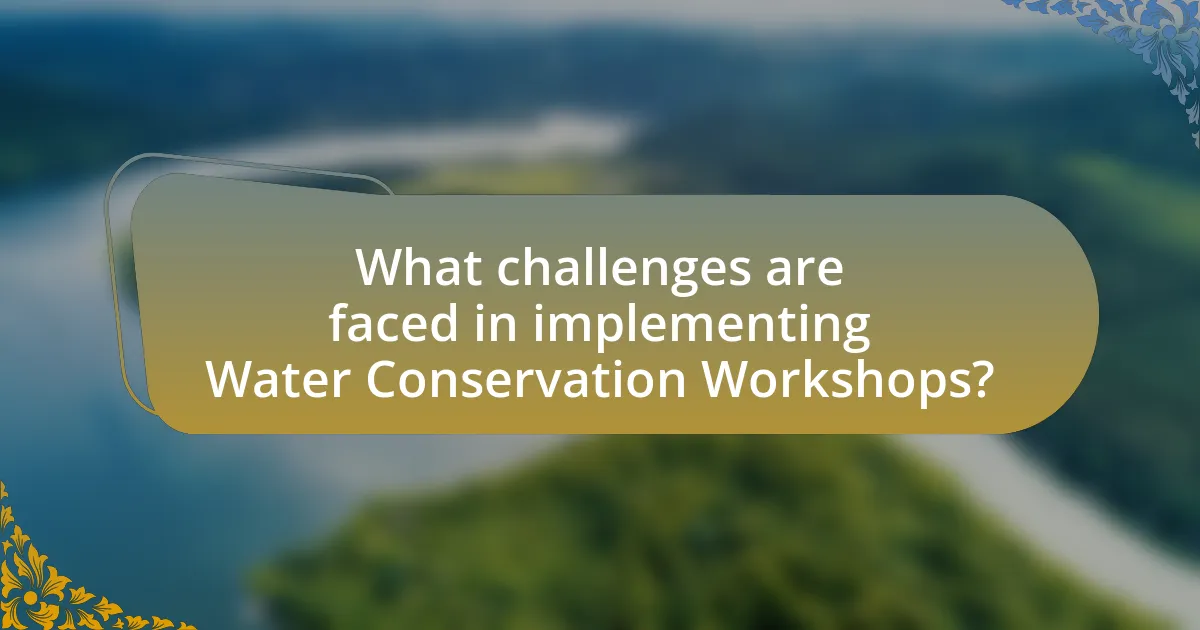
What challenges are faced in implementing Water Conservation Workshops?
Implementing Water Conservation Workshops faces several challenges, including limited funding, lack of participant engagement, and insufficient educational resources. Limited funding restricts the ability to develop comprehensive programs and materials, which can hinder the effectiveness of the workshops. Lack of participant engagement often results from insufficient awareness of water conservation issues, leading to low attendance and participation rates. Additionally, insufficient educational resources, such as trained facilitators and relevant materials, can compromise the quality of the workshops, making it difficult to convey important information effectively. These challenges collectively impact the overall success and sustainability of water conservation initiatives in educational settings.
What barriers do schools encounter when organizing these workshops?
Schools encounter several barriers when organizing water conservation workshops, including limited funding, scheduling conflicts, and lack of trained personnel. Limited funding restricts the resources available for materials and expert facilitators, making it challenging to deliver comprehensive workshops. Scheduling conflicts arise due to the existing curriculum and extracurricular activities, which can hinder student participation. Additionally, a lack of trained personnel to effectively lead these workshops can result in inadequate delivery of content, reducing the overall impact of the initiative. These barriers collectively impede the successful implementation of water conservation education in schools.
How can funding limitations affect the quality of workshops?
Funding limitations can significantly reduce the quality of workshops by restricting resources such as materials, expert facilitators, and venue options. When financial support is inadequate, organizers may have to compromise on the quality of instructional materials, leading to less engaging and informative sessions. For instance, a study by the National Science Foundation found that workshops with higher budgets were able to incorporate advanced teaching tools and experienced educators, resulting in better participant outcomes. Additionally, limited funding can lead to fewer workshops being offered, reducing access for potential attendees and ultimately diminishing the overall impact of educational initiatives like water conservation workshops in schools.
What logistical issues arise during the planning and execution of workshops?
Logistical issues that arise during the planning and execution of workshops include venue selection, scheduling conflicts, resource allocation, and participant engagement. Venue selection can be challenging due to availability, capacity, and accessibility, which directly impacts attendance and participation. Scheduling conflicts often occur when potential participants have prior commitments, leading to lower turnout rates. Resource allocation involves ensuring that materials, equipment, and facilitators are adequately provided, which can strain budgets and planning timelines. Additionally, maintaining participant engagement is crucial; if workshops lack interactive elements or relevant content, attendees may lose interest, undermining the workshop’s effectiveness. These issues are supported by research indicating that logistical challenges significantly affect the overall success of educational workshops, as highlighted in studies on workshop effectiveness in educational settings.
How can schools improve the effectiveness of their workshops?
Schools can improve the effectiveness of their workshops by incorporating hands-on activities and real-world applications related to water conservation. Research indicates that experiential learning enhances retention and engagement; for instance, a study by the National Oceanic and Atmospheric Administration found that students participating in interactive workshops demonstrated a 30% increase in knowledge retention compared to traditional lecture-based formats. Additionally, schools should gather feedback from participants to tailor future workshops, ensuring they address specific interests and concerns, which has been shown to increase participant satisfaction and learning outcomes.
What best practices should be adopted for workshop facilitation?
Effective workshop facilitation requires clear objectives, active participant engagement, and structured activities. Establishing clear objectives ensures that all participants understand the purpose and desired outcomes of the workshop, which is crucial for focused discussions and activities. Engaging participants actively through interactive methods, such as group discussions and hands-on activities, fosters collaboration and enhances learning retention. Structured activities, including time management and a well-defined agenda, help maintain the flow of the workshop and ensure that all topics are covered efficiently. Research indicates that workshops with these best practices lead to higher participant satisfaction and improved learning outcomes, as evidenced by studies showing that structured facilitation increases engagement and knowledge retention in educational settings.
How can feedback from students be utilized for future improvements?
Feedback from students can be utilized for future improvements by systematically analyzing their responses to identify strengths and weaknesses in the water conservation workshops. This analysis allows educators to adjust content, teaching methods, and engagement strategies based on student preferences and learning outcomes. For instance, if students express confusion about specific topics, educators can enhance clarity through additional resources or interactive activities. Research indicates that incorporating student feedback leads to a 20% increase in engagement and retention rates in educational programs, demonstrating the effectiveness of this approach.
What are some practical tips for conducting successful Water Conservation Workshops?
To conduct successful Water Conservation Workshops, focus on engaging participants through interactive activities and practical demonstrations. Incorporating hands-on experiences, such as water-saving techniques and real-life scenarios, enhances understanding and retention of information. Research indicates that interactive learning increases knowledge retention by up to 75%, compared to traditional lecture methods. Additionally, providing clear, actionable takeaways, such as tips for reducing water usage at home, reinforces the workshop’s objectives. Utilizing visual aids and local case studies can further contextualize the importance of water conservation, making the information more relatable and impactful for participants.
